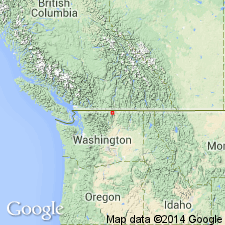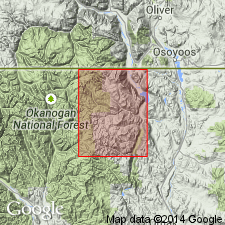
- Usage in publication:
-
- Horseshoe Mountain Porphyritic Leuco Quartz Monzonite
- Modifications:
-
- Original reference
- Dominant lithology:
-
- Quartz monzonite
- AAPG geologic province:
-
- Okanogan province
Summary:
Pg. 245-261. Horseshoe Mountain Porphyritic Leuco Quartz Monzonite or unit. Granite rocks along 49th parallel in Okanogan Range of northern Washington were first studied by Daly, 1912 (Canada Geol. Survey Mem. 39). A part of Daly's Okanogan Composite Batholith restudied for this report. It is here named Horseshoe Mountain Porphyritic Leuco Quartz Monzonite. This plutonic unit underlies 15 sq mi and was emplaced in Cordilleran eugeosyncline. Age is Mesozoic or Tertiary. Alkali feldspar phenocrysts discussed in detail.
[Named from exposures on Horseshoe Mountain, along 49th parallel in the Okanogan Range of northern WA.]
Source: US geologic names lexicon (USGS Bull. 1350, p. 347).

- Usage in publication:
-
- Horseshoe Mountain Porphyritic Leuco Quartz Monzonite
- Modifications:
-
- Age modified
- Revised
- AAPG geologic province:
-
- Okanogan province
Summary:
Horseshoe Mountain Porphyritic Leuco Quartz Monzonite in /Horseshoe Basin magma series [informal] (new). Mapped in Toats Coulee Creek region, Okanogan Range, Washington. Age is Early to medial Cretaceous.
["Horseshoe Basin magma series" considered informal. Term "Series" is applied formally only to chronostratigraphic units (ACSN, 1961, 1970; NACSN, 1983, 2005, 2021).]
Source: Modified from GNU records (USGS DDS-6; Menlo GNULEX).
For more information, please contact Nancy Stamm, Geologic Names Committee Secretary.
Asterisk (*) indicates published by U.S. Geological Survey authors.
"No current usage" (†) implies that a name has been abandoned or has fallen into disuse. Former usage and, if known, replacement name given in parentheses ( ).
Slash (/) indicates name conflicts with nomenclatural guidelines (CSN, 1933; ACSN, 1961, 1970; NACSN, 1983, 2005, 2021). May be explained within brackets ([ ]).

